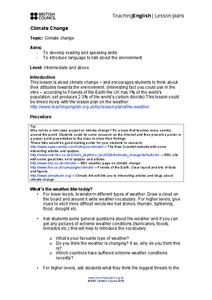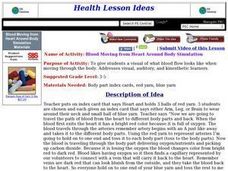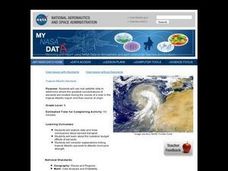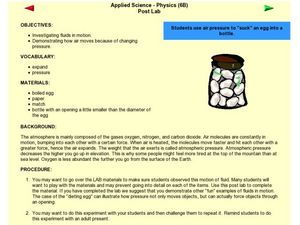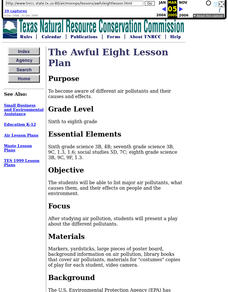Curated OER
Introduction to Dissolved Oxygen and Demonstration of a Simple Test Procedure
Students explain the importance of dissolved oxygen in water ecosystems. They describe the aquatic oxygen cycle and the effect of water pollution on oxygen. They make observations, collect data and draw a conclusion.
Curated OER
Climate Change
Young scholars brainstorm types of weather present threats to the world, specifically climate change and the environment. In this climate change lesson, students complete and discuss a set of worksheets about "going green," climate...
Curated OER
Altruism: Meeting Society's Needs
Students study society's needs and altruism within communities. In this altruism lesson, students identify and categorize the basic needs that human beings have and define altruism. Students complete research on altruistic...
Curated OER
Caverns: Drip Rate Analysis
Students tour a cave and collect water samples. They measure the drip rate from several locations inside the cave and discover the part water plays in cave formation.
Curated OER
Why Should I Care About Global Warming?
Students examine global warming, and the greenhouse effect. They determine the changes that happen and the adaptations that need to be made because of these occurrences. They look at the occurrence and effect of these phenomena in the past.
Curated OER
The Rubber Band Air Test
Young scholars complete an experiment to determine how dirty the air is in their local community. They analyze images and discuss the varying degrees of air pollution. They discuss the results of the experiment.
Curated OER
The Design Process
Students work together to construct a foundation of nine 3" x 5" index cards to support their 9" textbook off their desk. They summarize the steps used to solve the problem and discuss and compare their solutions. They then complete the...
Curated OER
What's the Matter? Where Did it Go?
Eighth graders analyze questions posted on a large poster in the room and work in groups to record their response to the question on paper, rotating to the next question after two minutes have passed. They review the characteristics of...
Curated OER
Comparing Earth and Mars
Learners work together to compare and contrast Mars and Earth. Using the internet, they answer questions given to them by their teacher and calculate answers showing their work. They graph their answers and discuss the results of the...
Curated OER
The Seven Characteristics of Life
Third graders investigate the characteristics of living and nonliving things. They conduct a research quest in order to identify the seven characteristics of life. Then students pick one aspect and use it to create a song meant to be...
Curated OER
BREAD IN A BAG
If possible, acquire a handful of wheat kernels from a local farmer or seed dealer. Hand them out so students can feel them and see what they look like. Share background information. 2. Draw a wheat kernel on the chalkboard, or use the...
Curated OER
Blood Moving from Heart Around Body Simulation
Pupils review circulation and blood flow patterns from different parts of the body. They play a game using colored yarn and index cards to simulate blood flow, oxygenated blood, arteries and veins.
Curated OER
Troical Atlantic Aerosols
Learners explore the effect aerosols have upon he weather and climate. They observe NASA satellite images to explore and draw conclusions about aerosol transport. From studying the images, students track the path of aerosols. They...
Curated OER
Food Chains, Food Webs, Biomass Pyramids and Cycle
In this food chains worksheet, students complete a crossword puzzle by placing 16 terms into the puzzle that match the clues given. Students review food webs, biomass pyramids, and the water cycle.
Curated OER
Does Climate Change Exist? Healthy Skepticism? Debating the Truth, Evidence, and Certainty of Climate Change
Students study climate change and the arguments of scientists that it exists. For this climate change lesson students complete a class activity and answer questions.
Curated OER
Ice Core Clues
Students create a PowerPoint presentation on the information they research about the ice cores and what they tell us about Earth's past. In this ice core lesson plan, students research radioactivity, air pollution, sodium, snowfall...
Curated OER
Tropical Atlantic Aerosols
Students analyze NASA data from the Multi-angle Imaging Spectroradiometer. In this NASA data lesson, students access an assigned website to examine information from the MISR on the Terra Satellite. They determine how desert dust travels...
Curated OER
Applied Science - Physics Pos Lab (Air Pressure)
Students examine physics. In this air movement lesson plan, students conduct an experiment that shows how air moves based on the pressure it's under. They watch the teacher complete the procedure and then try it on their own in a small...
Curated OER
Kernel Power" Ethanol Fuel from Corn
Students study why corn is a biodegradable, renewable resource. For this ethanol lesson students build models and observe a chemical reaction.
Curated OER
Unit 5 - Food
Students study the biodiversity existing in the Amazon rainforest. In this Amazon biodiversity instructional activity, students study diagrams, maps, and information about the biodiversity in the Amazon.
Curated OER
Pond Ecosystem Field Trip
Young scholars investigate the environment by participating in a class trip. In this pond ecosystem lesson plan, students define a list of vocabulary terms associated with ponds such as invertebrate and metamorphosis. Young scholars...
Curated OER
Permit Trading
Emerging environmentalists work in groups and pretend that each is a power company generating electricity for a community. They consider the costs of building a renewable electricity generator that will increasingly replace generating...
Curated OER
Activity #6 'Nothing' Matters: A Demonstration
Learners observe the 'pouring' of a gas. They compare the masses (weights) and densities of two gases. Pupils define the following terms: matter, mass, and density. Students answer questions after watching the demonstration.
Curated OER
The Awful Eight Lesson Plan
The pupils list major air pollutants, what causes them, and their effects on people and the environment. Students list ways they can prevent or reduce the types of air pollution mentioned in the play.

